Adil Najam
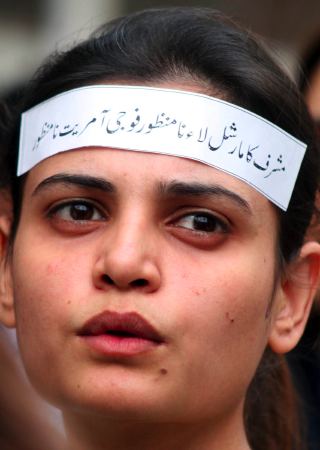 I have been traveling nearly non-stop over the last month, and events in Pakistan are headline news everywhere. More than that everyone is asking questions about Pakistan. An immigration official in Baku, Azerbaijan, asked me (2 weeks before the emergency) how long Musharraf will survive? A hotel receptionist in Musqat, Oman, asked more politely if “all is well in your country?” (one week before the emergency). In Pakistan (just days before the emergency) the question was more like “What is America planning for Pakistan?” A shop-keeper in Trondheim, Norway, asked (one day before the emergency) wondered if “Benazir will solve Pakistan’s problems?” And my driver in Cairo, Egypt, asked yesterday “Has Musharraf gone mad?”
I have been traveling nearly non-stop over the last month, and events in Pakistan are headline news everywhere. More than that everyone is asking questions about Pakistan. An immigration official in Baku, Azerbaijan, asked me (2 weeks before the emergency) how long Musharraf will survive? A hotel receptionist in Musqat, Oman, asked more politely if “all is well in your country?” (one week before the emergency). In Pakistan (just days before the emergency) the question was more like “What is America planning for Pakistan?” A shop-keeper in Trondheim, Norway, asked (one day before the emergency) wondered if “Benazir will solve Pakistan’s problems?” And my driver in Cairo, Egypt, asked yesterday “Has Musharraf gone mad?”
You have to be impressed by how much ordinary people around the world know about Pakistan. But also sad that this is what they are thinking when they think Pakistan.
I do not think I have been able to respond to any of them satisfactorily. Politics in Pakistan is way too complex, even for us Pakistanis.
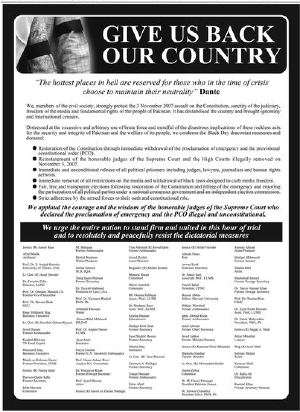 But to each I have said, in different ways, that the real story in Pakistan is not about Gen. Pervez Musharraf. The real story is about Pakistanis demanding democracy. The reason the general has had to use ever increasing pressure and more draconian measures is precisely because the people who want democracy are just not giving up. As we have said before, here is a democratic society trapped in an undemocratic state. This is a moment to be proud of Pakistanis. The failure here is not of Pakistan. It is of Gen. Pervez Musharraf (and he wrote his own indictment in his ’emergency’ speech).
But to each I have said, in different ways, that the real story in Pakistan is not about Gen. Pervez Musharraf. The real story is about Pakistanis demanding democracy. The reason the general has had to use ever increasing pressure and more draconian measures is precisely because the people who want democracy are just not giving up. As we have said before, here is a democratic society trapped in an undemocratic state. This is a moment to be proud of Pakistanis. The failure here is not of Pakistan. It is of Gen. Pervez Musharraf (and he wrote his own indictment in his ’emergency’ speech).
And this is what is most heartening. In response to a journalists question yesterday, I elaborated on something I have been saying already (here, here and here):
…this is a moment of great pride for Pakistanis. How can you not be proud of your people when ordinary citizens – lawyers, journalists, students – come out on he streets ready to be beaten up and put in jail… knowing that they will be crushed and yet demanding democracy…. this is NOT Pakistan’s failure… this is a moment of success for Pakistan’s people… the reason that the military government has been forced to apply ever greater force and every more draconian measures is simply because the democracy forces in the country (the lawyers, the students and journalists… unfortunately not the politicians as much) are simply unwilling to bow down. In the past people used to stop demanding democracy at much less pressure than this. Now they are resisting pressure and they keep demanding democracy and freedom.
Even as I travel (still on the road) and check email on unreliable connections and unfamiliar computers, I find my inbox and the comments on ATP innundated with information about what ordinary citizens are doing. This is most heartening.
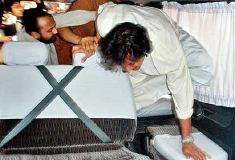
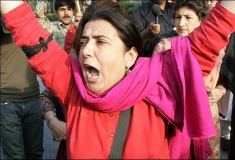

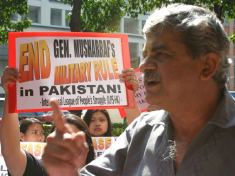
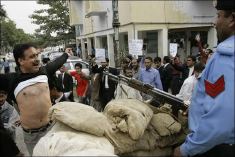
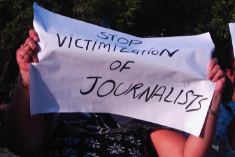
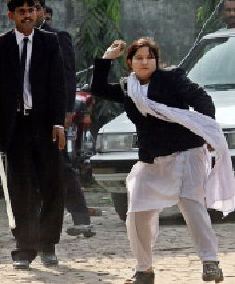
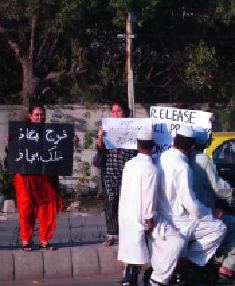


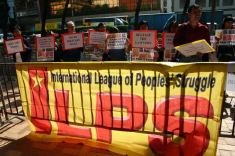
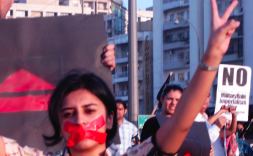
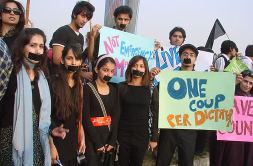
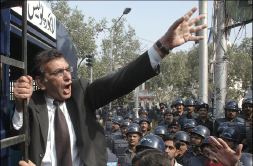
The pictures say it all and I will let the pictures do the talking here. But as I look at teh pictures, some points do pop into the head about who is protesting here and who is not. Maybe our readers can comment more on this:
- Note carefully who is protesting for freedom, human dignity and democracy. These are ordinary people. Lawyers. Students. Journalists.
- Note carefully who they represent. These are amongst the most so-called ‘secular’ and ‘liberal’ classes in society. The people who were supposed to be Gen. Musharraf natural constituency. Musharraf has lost the support of the very people who were supposed to be (but never really were) most aligned to him. [Readers, please spare us your diatribes and fatwas about what ‘secular’ and ‘liberal’ means. Despite the propaganda from some, neither of those terms means anti-religious or un-Islamic… There is a huge literature on this, so please read it. But, for Allah’s sake, not on Wikipedia!!].
- Note also the solidarity being shown by Pakistanis within and outside Pakistan. While there are obviously those who do support the general, the opposition to the emergency is more widespread than anything one can remember. One can scarcely think of any political act that has united our otherwise divided society they way the general opposition to the Emergency has.
- More importantly, please note who is NOT in the pictures. Who is not on the streets protesting.
- Political activists and political leaders are not on the streets. They make statements, but half-heartedly. This is not a movement led by politicians. In fact, it is not even clear whether the politicians are smart enough to just follow the people on the streets. Really conspicuous by their absence are the ‘political workers’. The Million who greeted Benazir, or were supposedly stopped from greeting Nawaz Sharif, or routinely come out for the MMA, are nowhere to be seen. Their leaders have failed to mobilize them, or maybe not tried to do so at all.
- The one exception to the above may be Imran Khan, but I have long felt that at his core he is more of a civil society actor than a political leader in the true sense; his stance, his style, and even his vote bank seems to suggest the same.
- Also conspicuous by their absence are the religious parties, the MMA. Beyond statements they do not have much to contribute here. Their words and boasts onpeople’s will and democracy are large but their actions no different from the secular parties.
- Finally, and probably most importantly, missing from the streets and from protests are the religious extremists (not to be confused with the religious parties which are religious but, mostly, not extremists). The folks who were killing and terrorizing and blowing up ordinary Pakistanis in Swat, in Islamabad, and elsewhere seem not too worried about the Emergency and not to unhappy at the death of democracy. They may even like it that way. This is important because supposedly the Emergency was imposed to curtail them and their activities. However, they seem to be neither affected not interested in the Emergency or the opposition to it.
While the shape of things will obviously evolve, it does seem that a new politics is taking shape in Pakistan. A people-centered politics that might just sideline the mainstream political parties as well as the extremists. It is way too early to say that this will happen. It is quite probable that it will not. But one can certainly not be faulted for hoping that it just might.




















































@Usman Akram
Spurious logic zindabaad. So if teh MAJORITY of all Pakistanis are not on teh streets that mean that they are all supporting Musharraf… wah bhai wah. Hum bewaqoof hain, par itnay bhi nahin.
The Million who greeted Benazir, or were supposedly stopped from greeting Nawaz Sharif, or routinely come out for the MMA, are nowhere to be seen.
Remember their local leaders who organize them are all in custody. This government is smart; they know where to hit. Only the informed people are protesting, common men who can
Adil Bhai
With due respects your central thesis is a little flawed. Several researchers on Pakistan have noted the paradox of Pakistani society and have termed it as stuck between a “democratic ideal versus autocratic reality”.
Our society has autocratic trends embedded in the family, school, madrassa, and other institutions – ruled by patriarchy and hierarchial rural social and economic relations. Whereas there is a yearning for democratic process, it often founders against the rocks of autocratic reality.
The current movement is heart warming – our middle classes have finally woken up – but in essence they are struggling for their own rights – this is why LUMS had the first protest as the bourgeois interests are well represented there.
The ‘ordinary’ people that you cite time and again in the post are actually the millions of landless poor who are toiling in the rural areas far from the globalized urban centres, the urban poor who run from pillar to post for a day’s meal – and they will not become a part of this movement until their interests are not articulated and no political party wants to do that.
It is a cliche now that land reform is an urgent need to fight rural poverty but NO political party or even the civil society talks about it.
Use of natural resources like irrigation water is another issue – therefore poltical mobilization is not in evidence.
The poor per many studies do NOT go to the courts in the first place – the lawyers and courts cost money and don’t have it. Health care costs keep the poor trapped in poverty; and education – we all know what is happening with state schools and madrassas.
So why should people or masses come out?
And as commentors have mentioned, the political parties are not inspiring confidence save a few hard core pockets of loyalists.
Having said this, this is a historical moment in our history where the ruling classes are split from within and are resisting the domination of one power group – therefore it is a welcome development in the erstwhile stagnant waters of Pakistani politics. However, to expect that the successful overthrow of the military ruler (like 1969) or a limited transition like (1988) and return to democracy will solve Pakistan’s problems nothing but naivete.
Pakistan’s pressing issues require much more than return to another set of ruling elites who just don’t wear uniforms!
P.S. My favourite was someone here who said that by visiting the blogs s/he is protesting against the emergency. Talk of armchair struggles ..amusing indeed – no offence intended.
Latest news: BB has asked USA to cut aid to Pakistan. So looting 1 biilions were not enough, now she also want to cut 1 billion/year aid to Pakistan. USA has already said that they will only cut 300 millions of aid which is used on education and health and not 700 million which is used for army anti terror operations.
CIA is trying to topple MUSh because he said NO to USA when they asked permision to attack FATA. BB at same time(end 0f 2006) promised USA full aceess to FATA as well as our nukes. Thats why USA is dying to install her as PM without Mush. This NRA was darama of BB. She just wanted to get rid of valid cases against her. Now she want to replace Mush so she can rule Pak without any check and balance.
Usman Akram mentions buying a property from a retired military officer. As the son of one such man let me clarify a few more things here. Officers have to pay a monthly sum out of their salary throughout the service to get a mediocre house at retirement. Even then, many of them sell these houses to get dowry for their daughters. My father sold his house even before we had ever seen it to send us to school in America. My parents still live in a rented house. Other government servants, even lawyers, and journalists have similar schemes where they can get some property or assets at the end of service. I am not trying to defend the alleged corruption of those at the highest echlons of government service. Just trying to point out the reality of life for most others.